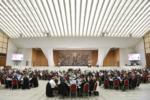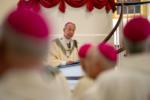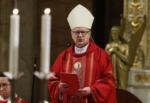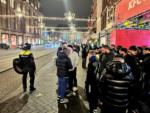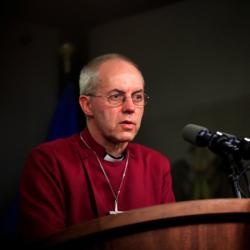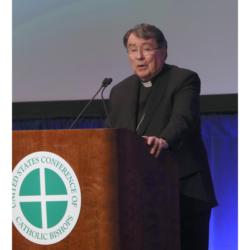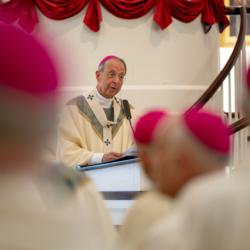St. Paul's Choir School joins BSO for Mahler's 'Symphony of a Thousand'
CAMBRIDGE -- One-hundred-fifty singers, eight soloists, over 100 musicians, 300 performers in total, 85 minutes of music, and 30 boys from St. Paul's Choir School in Cambridge, who joined the Boston Symphony Orchestra in its performances of Gustav Mahler's titanic "Symphony No. 8" from Oct. 4 to 6.
"It's very uplifting," seventh grader Dermot O'Boyle said when The Pilot visited the school on Oct. 17. "We're listening and performing beautiful music, and we also get to be a part of something that not many people have the opportunity to. We get to know the individual people that make it happen, and I could say that we almost become friends with them over the many rehearsals that we have throughout the week."
When he hears the applause at the end of each concert, he feels accomplished.
"It just kind of feels glorious," eighth grader Wyeth Sholl told The Pilot.
He added that singing with the BSO gets his adrenaline pumped.
"It's just hard to replicate," he said.
Mahler's "Symphony No. 8," composed in 1906, is commonly referred to as the "Symphony of a Thousand" due to the sheer number of people who can perform it. The monumental work has not been staged in Boston for 20 years, largely because Symphony Hall's stage cannot hold more than 300 performers. St. Paul's Choir School had to perform from the balcony.
"For boys this age to have an opportunity to sing a piece like that is fairly unusual," St. Paul's Music Director Brandon Straub told The Pilot, "especially this particular work, because Mahler's Eighth Symphony is so large and involves so many, many forces that it's very expensive to stage."
St. Paul's, the only Catholic boys' choir school in the U.S., has performed alongside the BSO for decades. The 30 students who performed the "Symphony of a Thousand" represented 70 percent of the student body. In the sheet music, they are the "knabenchor," German for boys' choir. In the second part, they are referred to as the "blessed boys." The first part of the symphony is sung in Latin, with text from the hymn "Veni, Creator Spiritus."
"They add another layer of reinforcing the text and the power of what's happening musically," Straub said.
The second part is sung in German and uses text from Goethe's "Faust."
"They're sort of almost like a mini Greek chorus," Straub said.
The boys are used to singing in Latin -- they do so during Mass at St. Paul Parish in Cambridge every Sunday -- but singing in German was a challenge for some of them. Rehearsals required learning German pronunciation along with the actual music.
"It's kind of nice to be able to sing in another language," Dermot said. "That's a bit of a rare experience for us. It makes it all the more special."
Once the new school year began, the boys only had one month to learn the music. At the beginning of summer, they received practice scores that were marked and put into sections so they could practice at home.
"It's a difficult score," Straub said, "even for an adult singer to track, to follow where your part goes through the score. It's so dense."
The "blessed boys" have multiple entrances where they sing briefly, then sit back down, then stand up to sing again moments later.
"Having a sense of how to find their first note, sometimes out of the blue, was challenging," Straub said.
A third of the choir consisted of new students, and Straub is still in his first year as music director. He said that, in those circumstances, putting on a work as massive as the "Symphony of a Thousand" was both exciting and daunting.
"I was really extremely proud of how they handled themselves in the performances," he said. "It was exciting to be a part of it. It was exciting for me to watch them. It was actually a highlight for me to watch them experience it and take it all in from the balcony."
When the students are preparing for such a significant performance, the teachers at St. Paul's give less homework.
"The school realizes how exhausting it is to perform with the BSO over multiple nights," Dermot said.
At a school like St. Paul's, Sholl said, preparing to sing with the BSO "blends into the day."
"It becomes normal for us," he said.


